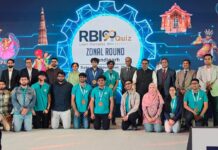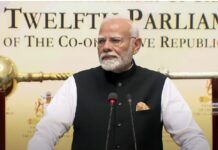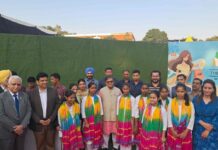Indo-UK workshop on tackling the energy/water/food nexus in Punjab concludes at PU
Chandigarh January 8, 2022
Indo-UK partnership development workshop on “Solar pump based village microgrids – potential for tackling the energy/water/food nexus in Punjab”concluded today at UIET Panjab University (PU), Chandigarh today.
This partnership development workshop was funded by Department of Science and Technology (DST) and UKIERI.
This workshop deliberated on developing methods to promote the uptake of solar irrigation pumps under the constraints of relatively high capital costs and a current regime of free or highly subsidised electricity for grid connected pumps. The intention is to incentivise water saving irrigation practices by providing remunerative alternatives for the excess energy generated by the arrays that power solar irrigation pumps. Community engagement and socio-technical considerations on socio-economic impact of Solar-Pump on livelihood of rural households of Punjab were also major discussion during workshop. Beside this, statistics of depleting water level in Punjab, reasons behind that, policy, regulations and planning with Solar Based DG for Power in farming, and straw burning issues-Detection and Monitoring were also highlighted.
During three days, the experts from universities of India and UK with background of engineering, economics, social Science, management start-up, NGO, industry and power companies deliberated upon the issues related to energy/water/ food nexus in Punjab. The policy and regulatory requirement with regard to water connection for irrigation were also discussed and the need of the grid connected solar pumping system in the region of Punjab was emphasised.
The delegates after three days long deliberations decided to work in three different areas which include developing a model solar pump based smart microgrid system set up in the village of Punjab and make the farmers aware about the features and benefits of such systems in irrigations of farms. This work will be executed by Indian Lead Coordinator Prof. Y P Verma from Panjab University and Prof. Cham Athwal from BCU UK.
The second major area of work will be involvement of stakeholders through various community engagement programs and carryout joint research about socio-economic-technical and political issues which needs to be addressed to make these initiative viable and practical in the villages. Prof. Nishi Sharma from Panjab University and Prof. Lynsey Melville from BCU UK will lead this project. The suitable business models for Implementation of Micro-Grids and energy requirement for irrigation pumps in the state of Punjab will also be proposed.
The third major area of collaboration will be development of technological solutions for energy/water/ food crisis using artificial intelligence, sensing techniques and applications of IoT. Prof. Naveen Aggarwal from PU and Prof. Florimond from UK will lead this work.
















